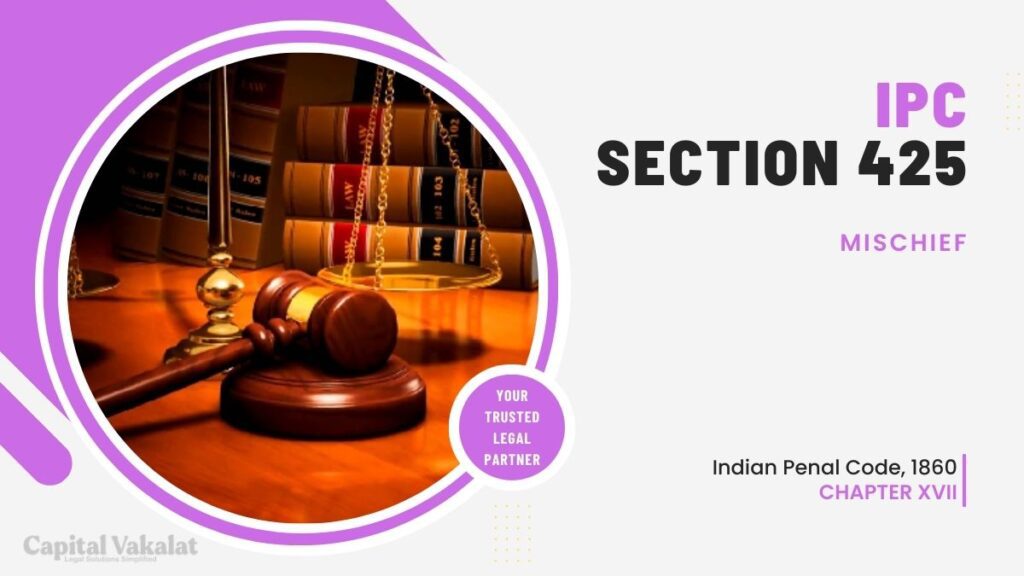Section 425 of the Indian Penal Code (IPC) deals with the offense of mischief. Mischief, in the legal context, encompasses a range of activities that cause damage, harm, or injury to the property of another person.

This section plays a crucial role in maintaining public order and ensuring that individuals are held accountable for their actions.
Elements of Mischief under Section 425 IPC
To comprehend Section 425 IPC, it’s essential to understand the key elements that constitute mischief. The section covers a wide array of activities, including vandalism, destruction of property, and any intentional act that causes harm to another’s belongings. The primary focus is on the malicious intent behind such actions.
Criminal Intent and Mens Rea
One of the fundamental aspects of Section 425 IPC is the requirement of criminal intent, commonly referred to as “mens rea.” This legal principle emphasizes that an individual must have a guilty mind or wrongful intention while committing the act of mischief. Proving mens rea is crucial in establishing guilt under this section.
Acts Constituting Mischief
The scope of mischief under Section 425 IPC is extensive. It includes a variety of actions such as defacement of public property, damaging vehicles, and trespassing with the intent to cause harm. Real-life examples of cases falling under this section help illustrate the diverse nature of mischief offenses.
Legal Consequences and Punishments
The legal consequences for mischief vary based on the severity of the offense. Section 425 prescribes punishments that may include imprisonment and fines. Understanding the nuances of these penalties is crucial for both legal practitioners and the general public to ensure compliance with the law.
Landmark Cases and Precedents
Examining landmark cases and legal precedents provides insights into the interpretation and application of Section 425 IPC. Notable cases where this section played a pivotal role in delivering justice contribute to the evolving legal landscape surrounding mischief.
Challenges and Controversies
Like any legal provision, Section 425 IPC is not without its challenges and controversies. Debates may arise regarding the subjective nature of determining intent or the appropriateness of punishments. Analyzing these issues sheds light on potential areas for legal reform or clarification.
Application in Different Jurisdictions
The application of Section 425 IPC may differ across jurisdictions. A comparative study helps identify variations in interpretation and implementation. Recognizing these differences is essential for individuals navigating legal systems in different regions.
Preventive Measures and Legal Advice
To avoid unintentional engagement with Section 425 IPC, individuals should be aware of preventive measures. This includes respecting others’ property, understanding boundaries, and seeking legal advice when in doubt. Promoting awareness can contribute to a more informed and law-abiding society.
Conclusion
In conclusion, Section 425 IPC serves as a crucial tool in maintaining order and ensuring accountability for actions causing harm or damage to property. Its multifaceted nature requires a comprehensive understanding of the legal elements involved. Landmark cases, challenges, and preventive measures collectively contribute to a nuanced perspective on mischief under this section.
Frequently Asked Questions
Are there different punishments for varying degrees of mischief?
Yes, Section 425 IPC prescribes different punishments based on the severity of the mischief offense. Penalties may include imprisonment and fines, depending on the circumstances.
How does Section 425 IPC apply to digital or online mischief?
While Section 425 primarily deals with physical damage to property, evolving legal interpretations may extend its application to certain forms of digital mischief. However, specific provisions may apply to cybercrimes.
Can unintentional actions be considered mischief under Section 425 IPC?
Generally, Section 425 requires a deliberate and malicious intent. Unintentional actions may not fall under this section, but legal advice is recommended for specific cases.